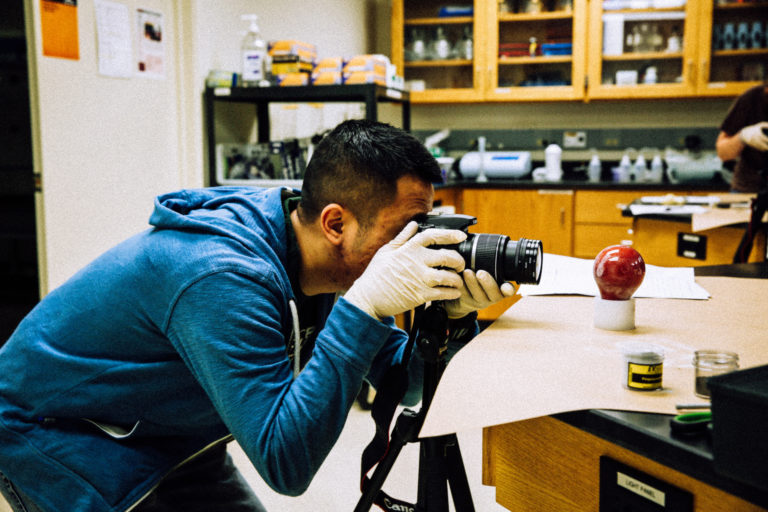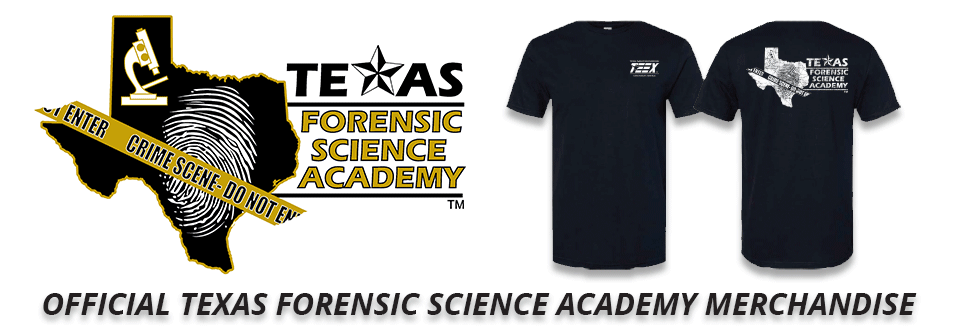Forensics in the Classroom School Educator
Required Courses
- Foundations of Forensic Photography
- Foundations of Fingerprint Comparison
- Foundations of Courtroom Testimony
- Basic Criminal Investigation (Classroom or Online)
- Death Investigation (Classroom or Online)
- Crime Scene Processes and Field Skills
- Laboratory Practices in Forensic Science
- Phase I (forthcoming)
- Phase II (forthcoming)
Once all TEEX courses have been completed, applicants should confirm they meet all certificate requirements using the Forensics in the Classroom School Educator Application and return it to the TEEX Law Enforcement & Protective Services division. Eligibility of each candidate will be reviewed and email notification of decision will be sent.
Effective September 1, 2024, the unit price fee for the standard certificate will increase from $37 to $50. This fee change will apply for all applications received on or after this date.
Note: All courses must be taken within seven (7) years of the date of the application. Only one course from another provider will be accepted if the curriculum and hours match TEEX curriculum. To submit training for TEEX course equivalency review/consideration, please submit the following:
- Copy of the course syllabus
- Copy of the certificate of completion
- Details of the training event
- Dates of training
- Format of training (in person, online, webinar, other)
TEEX’s approval decision is based on equivalency of course content, activities, and duration. TEEX will review your course equivalency request and make a determination on a case-by-case basis; additional information may be required from you.

Texas Forensic Science Academy is now selling t-shirts! Order yours at the following link: bit.ly/teexstore

| Category | Course # | Course Title | Description | Funding Options & Delivery Types | Division | Learn More Buttons |
|---|---|---|---|---|---|
| Forensics in the Classroom School Educator | FSA105 | Basic Criminal Investigation |
This course prepares participants for their transition from a traditional patrol/traffic function to an investigative position, such as a detective. The Basic Criminal Investigation course is also appropriate for those agencies that require officers to perform both patrol and investigative…
Show more |
Face-to-Face | Learn More about Basic Criminal Investigation |
| Forensics in the Classroom School Educator | FSA110 | Death Investigation |
From the moment a human body is discovered, there are many potential causes, factors, and circumstances that must be considered in completing a thorough criminal investigation and potential prosecution. This course addresses the procedures for conducting investigations of various types of…
Show more |
Face-to-Face | Learn More about Death Investigation |
| Forensics in the Classroom School Educator | FSA114 | Death Investigation (Online) |
From the moment a human body is discovered, there are many potential causes, factors, and circumstances that must be considered in completing a thorough criminal investigation and potential prosecution. This online course addresses the procedures for conducting investigations of various…
Show more |
Online | Learn More about Death Investigation (Online) |
| Forensics in the Classroom School Educator | FSA115 | Foundations of Fingerprint Comparison |
Identification of suspects through fingerprint comparison is critical for many investigators. This online course teaches participants the fundamental principles of fingerprint comparison while guiding them through the ACE-V Methodology (Analysis, Comparison, Evaluation, and Verification)….
Show more |
Online | Learn More about Foundations of Fingerprint Comparison |
| Forensics in the Classroom School Educator | FSA116 | Foundations of Forensic Photography |
Photography is a critical element in the documentation of criminal investigations. This online course addresses the basic concepts of photography and their application to professional investigative documentation. For the final project, participants have the opportunity to capture photographs…
Show more |
Online | Learn More about Foundations of Forensic Photography |
| Forensics in the Classroom School Educator | FSA118 | Foundations of Courtroom Testimony |
Those who conduct investigations or deal with evidence are expected to testify as expert witnesses. This means they must establish credibility the moment they enter the courtroom and proceed to the witness stand to present their testimony. This online course provides participants with an…
Show more |
Online | Learn More about Foundations of Courtroom Testimony |
| Forensics in the Classroom School Educator | FSA250 | Crime Scene Processes & Field Skills – Phase I |
This unique course developed for forensic and criminal justice educators provides participants with a hands-on, application-driven training event that presents new skills to less experienced educators and enhances the skills of the more experienced. Instruction will be on the core concepts and…
Show more |
Face-to-Face | Learn More about Crime Scene Processes & Field Skills – Phase I |
| Forensics in the Classroom School Educator | FSA251 | Crime Scene Processes & Field Skills – Phase II |
This unique course developed for forensic and criminal justice educators provides participants with a hands-on, application-driven training event that expands upon the concepts learned in Crime Scene Processes and Field Skills Phase I. Instruction will be on the progressively more advanced…
Show more |
Face-to-Face | Learn More about Crime Scene Processes & Field Skills – Phase II |
